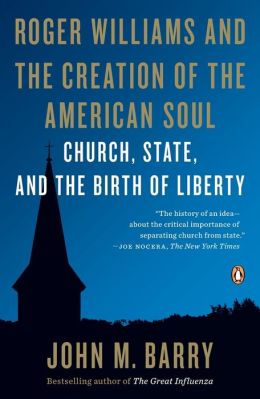
Barry began by contrasting Roger Williams and John Winthrop, explaining that their conflicting views of religion and government were to become the quintessential American struggle. John Winthrop, the Puritan leader of Massachusetts Bay Colony, believed that the colony offered an opportunity to develop a new kind of society, in which the government and people would work together to glorify God. His famous sermon suggested that the new colony could (and should) be a “city on a hill,” bringing others to Puritanism.
In contrast, Williams, also a minister, believed that the only way to bring glory to God was to separate religion and the government. He believed that the church was so sacred and pure that it should not be linked to the government. Thus, Winthrop and Williams represent two key political issues which Americans have struggled with since the 1600s: the relationship between church and state, and the relationship between the free individual and the state.
So if Williams’ ideas were radically different from Winthrop’s, where did they come from? Barry suggests that Williams was influenced by English history, his mentors, and the Bible. As we noted before, context matters, and Roger Williams was profoundly affected by his historical context. He witnessed tumultuous changes in the English government throughout his life. During the English Civil War, leaders linked their religious commitments to Anglicanism, Catholicism, and Puritanism with politics, radically altering the course of English history.
As in any time of upheaval, political theorists worked hard to make sense of the situation and determine how to fix it, and Barry notes that Roger Williams was influenced by a few of the English political theorists of the 1600s. Most importantly, Edward Coke, an English judge and politician, mentored Williams. Coke originated ideas like habeas corpus (which gave people the right to appear before a judge or in a court when they were arrested) and other theories about the proper relationship between the individual and the state. You may actually have heard of Coke since he coined the phrase “the house of every one is as his castle.” And, although Francis Bacon was a political enemy of Coke, Williams also absorbed important lessons from Bacon, the man who invented the modern day scientific method. From Bacon, Williams learned to think about the world around himself logically. In other words, Barry suggests that before leaving for the British North American colonies, Roger Williams had discovered what to think from Edward Coke, and how to think from Francis Bacon.
Williams applied these theories to his study of the Bible. A devout Christian, Williams believed that the Bible contained truth, but he had little faith in any one particular human interpretation or translation. This belief directly tied in with his vision for religion and politics. If human interpretations were inherently flawed, how could a government or leader force others to believe one particular interpretation of the Bible?
So by the time that he encountered John Winthrop and his vision for a Godly society, Roger Williams had already thought deeply about politics and religion. Thus, when he quarreled with the Puritans in Massachusetts Bay Colony and was banished, he founded Providence with these ideas in mind. Rather than building the legal code based upon scripture as John Winthrop sought to do in Massachusetts, Williams believed that religion could not be enforced by force. He established religious freedom in order to protect the sacred church from the corrupt state, fearing that whenever politics and religion combine, politics always wins. By structuring Rhode Island like this, Barry noted that Williams was the first modern person to link freedom of religion to freedom in general, and to declare that political power was not from God, but from the people.
William’s vision culminated in the 1663 charter granted by Charles II. Barry speculates that Charles II was willing to sign the “livelie experiment” into law simply because it was an experiment, and Rhode Island was far enough from England that it would not hurt the mother country if it failed. Even though as king he was the head of the Church of England, Charles II was sympathetic to Catholicism (and even converted on his death bed), so he may also have been excited by the prospect of religious freedom somewhere on the globe.
So, as we celebrate the anniversary of the Charles II Charter this year during the Spectacle of Toleration project, how should we think about Roger Williams’ legacy? As with all historical figures, Williams’ star has risen and fallen within the eyes of historians in the past 350 years. Although historians try to be impartial when studying the past, they are affected by their own context within time. Some historians believe that Williams’ legacy was limited. They argue that though Williams was an important figure in Rhode Island’s past, his influence did not extend beyond the small colony and state. Others give Williams more credit, suggesting that his vision directly impacted the separation of church and state in the United States, as well as the role of the individual and the government more generally. Barry himself suggests that while Roger Williams’ writings may not have directly influenced the United States’ founding documents, his ideas influenced John Locke, who in turn directly influenced the founding fathers.
As we continue to think about religion and politics in history for the rest of the summer, keep Roger Williams’ conception of a government separate from the church in mind. How has this idea affected the American government? But, also remember that his story is not the whole story. John Winthrop’s vision of the government as a city on the hill has also been influential. Which model do you find more persuasive? And which do you think has had the biggest affect on the history of the United States?

Pingback: Spectacle of Toleration » “A Plan of the Town of Newport in Rhode Island:” Newport’s Colonial Landscape